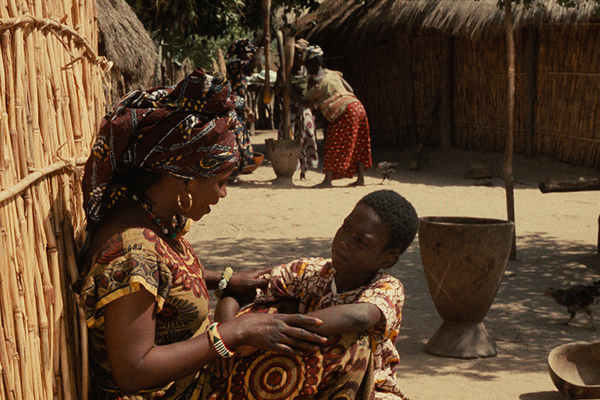Njangaan
de Mahama Johnson Traoré , Sénégal , 1975
The father of 6-year-old Mame entrusts his son, against his mother's wishes, to a marabout who teaches at a “daara.” At this Koranic school, students are subjected to strict religious instruction. Life is difficult for the children, who are forced to beg, collect wood, and cultivate the master's fields. Mame runs away and returns home.
Information about the film's rights and desired prospects
Film representative: Léa Baron (distributor)
Right-holder: Sidy Mahama Johnson Traoré, son and rights holder of the filmmaker, Sunu Films
Available rights: TV, VOD, AVOD, video editions are free of rights in all territories as well as certain territories in theatrical distribution depending on the country.
Priority needs for the film: Theatrical distribution, video releases, new contacts, broadcasting.

Mahama Johnson Traoré, born in Dakar in 1942, initially studied to become an electrical engineer. Wanting to become a director, he enrolled at the Conservatoire libre du cinéma français in Paris, then trained during internships at ORTF. Upon his return to Senegal, he became one of his country's leading directors, following in the footsteps of Ousmane Sembène. In 1968, he shot Diankha-bi, a medium-length film built around the intertwined portraits of three young women at the crossroads between African culture and Western lifestyle. His first feature film, Diegue-bi (1970), was a great success, and he followed it up with Laambaye (1972), an adaptation of a play by Nicolas Gogol that tackles corruption. That same year, he made Reou-Takh, in which an African American arrives in Dakar and finds that reality does not match his fantasies: there he discovers poverty, unemployment, and social inequality. Subversive, the film was banned for a long time by the Senegalese government.
Highly committed, Mahama Johnson Traoré addresses social and political issues in his works, which he wants to bring to the public's attention. In Njangaan, he tackles the subject of talibés, children separated from their families and placed under the authority of marabouts, who exploit their labor and force them to bring in money. Through the edifying journey of young Mame, the director denounces this widespread practice. While clarifying his intentions, he describes the situation that is plaguing his country: "Today's marabouts have free labor and means of persuasion that are stronger than those of politicians who speak on the radio or at rallies. They are the biggest bourgeoisie in contemporary Senegal. I would like to point out that I am not attacking religion as such, but those who divert it from its objectives to oppress the people by deceiving them." (in Cinéastes d'Afrique noire, Guy Hennebelle and Catherine Ruelle, Jeune Cinéma / CinémAction, 1978).
Presented at the Directors' Fortnight at the Cannes Film Festival in 1975, Njangaan is a bold film that vigorously highlights a phenomenon that is still relevant today.
Njangaan
Senegal, 1975, 1h27, color, format 1.66
Directed by Mahama Johnson Traoré
Screenplay by Chérif Adrame Seck
Cinematography by Baïdy Sow
Edited by Marcel Hanoun
Produced by Société Nationale de Cinématographie, Sunu Films
Starring Abou Camara, Fatim Diagne, Mody Gueye, Bassirou Kane, Mame N’diaye
Restored by Cinémathèque Afrique and the Institut français.
Carried out in June 2024 by Hiventy Transperfect.
Thanks to Sunu Films Production
The film has been awarded the Lumière Classics label, which recognizes the best restorations of the year.




